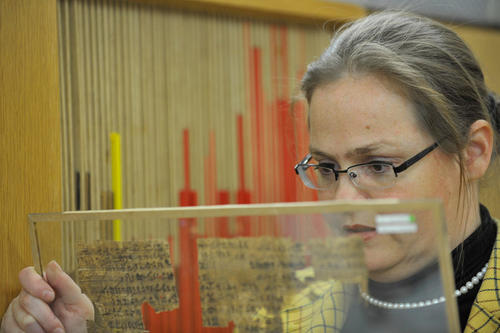The Past Is Never Far
Verena Lepper, curator of the papyrus collection at the Egyptian Museum in Berlin, teaches at Freie Universität
Feb 29, 2012
Verena Lepper is curator of the papyrus collection of the Egyptian Museum. The ancient Egyptian and Oriental papyri, texts, and drawings on writing material produced from the papyrus plant, bear witness to the first civilizations of humankind.
Image Credit: Bernd Wannenmacher
In the north wing of the New Museum, just past the small cupola-topped room housing the famous bust of Nefertiti, a number of highly fragile treasures await the visitor: ancient Egyptian and Middle Eastern papyri, texts and drawings set down on writing material produced from the papyrus plant, bearing witness to humankind’s first cultures. Since 2008, Verena Lepper, who holds a doctorate in Egyptology, has been in charge of caring for and preserving the Egyptian Museum’s collection of 60,000 manuscripts and papyri.
“The texts of these papyri are not dry, old documents – on the contrary: They are incredibly vivid,” says Lepper, 38. Many of the topics in the realms of literature, medicine, or religion that the ancient Egyptians considered and wrote down are still relevant today. Lepper found this sense of proximity with the past early on, when she was writing her dissertation on the Westcar Papyrus, the longest literary text from the classical Egyptian period. “They’re wonderful stories that take an ironic view of Pharaoh, and some of them convey a lot of humor,” she reports.
When Lepper talks about her job and her field of research, it is immediately clear that she really throws herself into what she does. Her inclination toward Egyptology emerged early on: Thanks to a dedicated history teacher, her interest in ancient cultures was sparked in grade school, so Lepper transferred to an academic secondary school focusing on the humanities so that she could learn the ancient languages – Greek, Hebrew, and Latin.
During her studies of Egyptology, Semitic Studies, and Christian Middle Eastern Studies in Bonn, Oxford, and Tübingen, she learned not only five Egyptian languages (Old Egyptian, Middle Egyptian, Late Egyptian, Demotic, and Coptic), but also various Semitic languages, such as Aramaic, Arabic, Syrian, and Ugaritic. Lepper considers having solid skills in these languages and scripts the key to understanding the cultures involved.
Over her extensive academic career, which has taken her to both Bonn and Harvard, Lepper has always had a knack for drawing connections between her scholarly work and matters that are important to the wider society. In connection with her appointment to the Junge Akademie of the Berlin-Brandenburg Academy of Sciences and Humanities (BBAW), for example, Lepper has initiated efforts to improve teaching at universities and to support less-represented disciplines, such as Egyptology.
In her current position as a researcher at the Egyptian Museum and within the papyrus collection, Lepper views close interaction between her work at the museum and university teaching as appealing: Since the summer semester of 2011, she has been teaching at the Egyptology Institute at Freie Universität. She allows her students to study the original documents in the collection directly, viewing the museum not only as an exhibition site, but also as a place of research.
Her commitment and dedication to the area where academia meets society recently won Lepper recognition in the “Germany – Land of Ideas” initiative, which is jointly sponsored by representatives of the private sector and the German federal government. Lepper is among the “100 women of tomorrow” to be named by Germany’s President for their active role in shaping the country’s future across a broad range of different fields. The fact that a scholar of ancient studies has received this forward-looking distinction, Lepper says, shows once again how much the early days of human culture can teach us about the present: “We can learn a lot from ancient Egyptian and Middle Eastern texts, perhaps even scaling back our technical arrogance a bit. After all, many discoveries are not ours alone, but date back to humanity’s oldest culture.”

